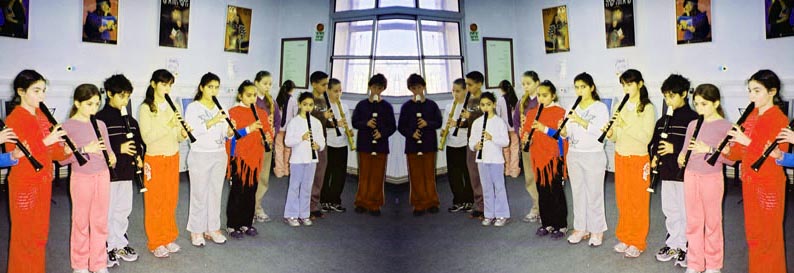Havrutav - English version > home page
English Menu |
Music requires listening and observation. It demands discipline and offers an experience involving "value". Most people do not remain indifferent to music: it has the power to improve an atmosphere, to affect moods, and to serve as a means of expression and an object of identification.
Musical activity develops concentration, memory and spatial perception. Numerous studies demonstrate a connection between musical education and the development of intelligence. At a basic level music interacts with the foundational elements of human existence:
Love (the innocent desire for the other's good)
Understanding (the use of thought, curiosity, observation, analysis, etc.)
Art (aesthetics, the "how" of living, beauty)
Faith in something beyond human existence, beyond life as perceived by the senses.
Music supports all of these elements, but this support often needs to be guided and mediated by an educator.
When I improve the execution of a musical piece, I work on several levels that are inseparably integrated, and all of which form part of a holistic human experience:
The physical level: music is the outcome of physical activity (singing, percussion, blowing, or strumming).
The cognitive level: The use of memory, thought and logic, to execute a musical phrase.
The emotional level: Emotion sets the process of playing music into motion, and is also reciprocally impacted by the acoustic products of playing music.
The spiritual, transcendent level: The interconnections among these three levels are very complex, and always include an element of surprise that cannot be predicted or mapped out, but which is tied to contemplation, listening, creativity and inspiration.
Musical learning, therefore, is multi-dimensional. If we compare it, for example, to the learning of a software program, we shall see how much more complex, refined, and multifaceted it is. Music has no "positive" and "negative" – "yes" I understand, or "no" – I do not. Instead, in music one works on the entire intermediate range where there is infinite room for improvement, and this journey toward one's own "best horizon" has value in and of itself.
The guiding principle of artistic music-making is the maximal development of a musical ideal (usually a theme, a melody or a motif). When we are emotionally, rationally, and physically in tune with an idea – we develop it internally. Listening and following the development of an idea in creative art (a process, it is important to note, that is emotional, and sometimes unconscious) simultaneously helps us develop and become acquainted with an additional level of our emotional make-up.
